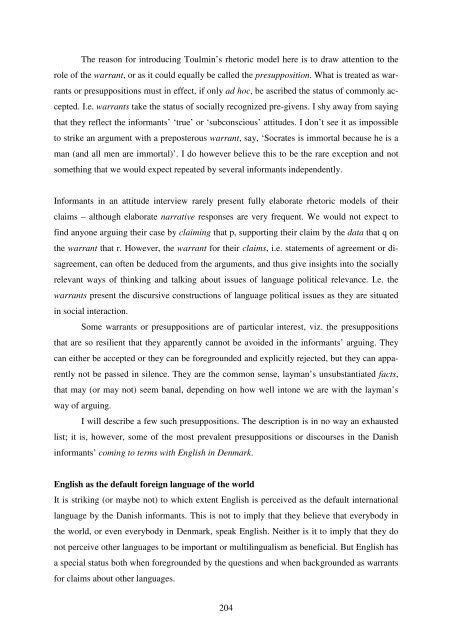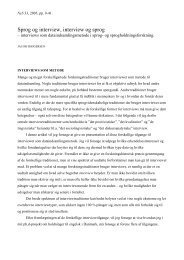Hør dog hvad de siger - Note-to-Self: Trials & Errors
Hør dog hvad de siger - Note-to-Self: Trials & Errors
Hør dog hvad de siger - Note-to-Self: Trials & Errors
You also want an ePaper? Increase the reach of your titles
YUMPU automatically turns print PDFs into web optimized ePapers that Google loves.
The reason for introducing Toulmin’s rhe<strong>to</strong>ric mo<strong>de</strong>l here is <strong>to</strong> draw attention <strong>to</strong> the<br />
role of the warrant, or as it could equally be called the presupposition. What is treated as war-<br />
rants or presuppositions must in effect, if only ad hoc, be ascribed the status of commonly ac-<br />
cepted. I.e. warrants take the status of socially recognized pre-givens. I shy away from saying<br />
that they reflect the informants’ ‘true’ or ‘subconscious’ attitu<strong>de</strong>s. I don’t see it as impossible<br />
<strong>to</strong> strike an argument with a preposterous warrant, say, ‘Socrates is immortal because he is a<br />
man (and all men are immortal)’. I do however believe this <strong>to</strong> be the rare exception and not<br />
something that we would expect repeated by several informants in<strong>de</strong>pen<strong>de</strong>ntly.<br />
Informants in an attitu<strong>de</strong> interview rarely present fully elaborate rhe<strong>to</strong>ric mo<strong>de</strong>ls of their<br />
claims – although elaborate narrative responses are very frequent. We would not expect <strong>to</strong><br />
find anyone arguing their case by claiming that p, supporting their claim by the data that q on<br />
the warrant that r. However, the warrant for their claims, i.e. statements of agreement or di-<br />
sagreement, can often be <strong>de</strong>duced from the arguments, and thus give insights in<strong>to</strong> the socially<br />
relevant ways of thinking and talking about issues of language political relevance. I.e. the<br />
warrants present the discursive constructions of language political issues as they are situated<br />
in social interaction.<br />
Some warrants or presuppositions are of particular interest, viz. the presuppositions<br />
that are so resilient that they apparently cannot be avoi<strong>de</strong>d in the informants’ arguing. They<br />
can either be accepted or they can be foregroun<strong>de</strong>d and explicitly rejected, but they can appa-<br />
rently not be passed in silence. They are the common sense, layman’s unsubstantiated facts,<br />
that may (or may not) seem banal, <strong>de</strong>pending on how well in<strong>to</strong>ne we are with the layman’s<br />
way of arguing.<br />
I will <strong>de</strong>scribe a few such presuppositions. The <strong>de</strong>scription is in no way an exhausted<br />
list; it is, however, some of the most prevalent presuppositions or discourses in the Danish<br />
informants’ coming <strong>to</strong> terms with English in Denmark.<br />
English as the <strong>de</strong>fault foreign language of the world<br />
It is striking (or maybe not) <strong>to</strong> which extent English is perceived as the <strong>de</strong>fault international<br />
language by the Danish informants. This is not <strong>to</strong> imply that they believe that everybody in<br />
the world, or even everybody in Denmark, speak English. Neither is it <strong>to</strong> imply that they do<br />
not perceive other languages <strong>to</strong> be important or multilingualism as beneficial. But English has<br />
a special status both when foregroun<strong>de</strong>d by the questions and when backgroun<strong>de</strong>d as warrants<br />
for claims about other languages.<br />
204



